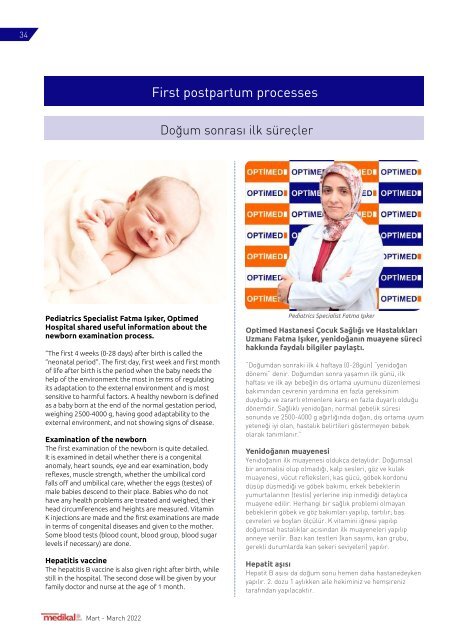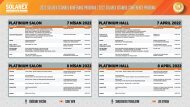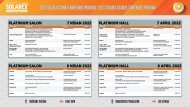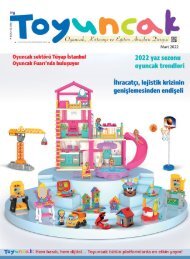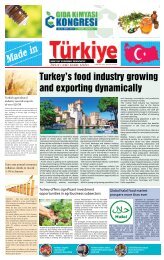Medikal Teknik Mart 2022
Medikal Teknik Mart 2022
Medikal Teknik Mart 2022
Create successful ePaper yourself
Turn your PDF publications into a flip-book with our unique Google optimized e-Paper software.
34<br />
First postpartum processes<br />
Doğum sonrası ilk süreçler<br />
Pediatrics Specialist Fatma Işıker, Optimed<br />
Hospital shared useful information about the<br />
newborn examination process.<br />
“The first 4 weeks (0-28 days) after birth is called the<br />
“neonatal period”. The first day, first week and first month<br />
of life after birth is the period when the baby needs the<br />
help of the environment the most in terms of regulating<br />
its adaptation to the external environment and is most<br />
sensitive to harmful factors. A healthy newborn is defined<br />
as a baby born at the end of the normal gestation period,<br />
weighing 2500-4000 g, having good adaptability to the<br />
external environment, and not showing signs of disease.<br />
Examination of the newborn<br />
The first examination of the newborn is quite detailed.<br />
It is examined in detail whether there is a congenital<br />
anomaly, heart sounds, eye and ear examination, body<br />
reflexes, muscle strength, whether the umbilical cord<br />
falls off and umbilical care, whether the eggs (testes) of<br />
male babies descend to their place. Babies who do not<br />
have any health problems are treated and weighed, their<br />
head circumferences and heights are measured. Vitamin<br />
K injections are made and the first examinations are made<br />
in terms of congenital diseases and given to the mother.<br />
Some blood tests (blood count, blood group, blood sugar<br />
levels if necessary) are done.<br />
Hepatitis vaccine<br />
The hepatitis B vaccine is also given right after birth, while<br />
still in the hospital. The second dose will be given by your<br />
family doctor and nurse at the age of 1 month.<br />
Pediatrics Specialist Fatma Işıker<br />
Optimed Hastanesi Çocuk Sağlığı ve Hastalıkları<br />
Uzmanı Fatma Işıker, yenidoğanın muayene süreci<br />
hakkında faydalı bilgiler paylaştı.<br />
“Doğumdan sonraki ilk 4 haftaya (0-28gün) “yenidoğan<br />
dönemi” denir. Doğumdan sonra yaşamın ilk günü, ilk<br />
haftası ve ilk ayı bebeğin dış ortama uyumunu düzenlemesi<br />
bakımından çevrenin yardımına en fazla gereksinim<br />
duyduğu ve zararlı etmenlere karşı en fazla duyarlı olduğu<br />
dönemdir. Sağlıklı yenidoğan; normal gebelik süresi<br />
sonunda ve 2500-4000 g ağırlığında doğan, dış ortama uyum<br />
yeteneği iyi olan, hastalık belirtileri göstermeyen bebek<br />
olarak tanımlanır.”<br />
Yenidoğanın muayenesi<br />
Yenidoğanın ilk muayenesi oldukça detaylıdır. Doğumsal<br />
bir anomalisi olup olmadığı, kalp sesleri, göz ve kulak<br />
muayenesi, vücut refleksleri, kas gücü, göbek kordonu<br />
düşüp düşmediği ve göbek bakımı, erkek bebeklerin<br />
yumurtalarının (testis) yerlerine inip inmediği detaylıca<br />
muayene edilir. Herhangi bir sağlık problemi olmayan<br />
bebeklerin göbek ve göz bakımları yapılıp, tartılır; baş<br />
çevreleri ve boyları ölçülür. K vitamini iğnesi yapılıp<br />
doğumsal hastalıklar açısından ilk muayeneleri yapılıp<br />
anneye verilir. Bazı kan testleri (kan sayımı, kan grubu,<br />
gerekli durumlarda kan şekeri seviyeleri) yapılır.<br />
Hepatit aşısı<br />
Hepatit B aşısı da doğum sonu hemen daha hastanedeyken<br />
yapılır. 2. dozu 1 aylıkken aile hekiminiz ve hemşireniz<br />
tarafından yapılacaktır.<br />
<strong>Mart</strong> - March <strong>2022</strong>


